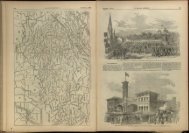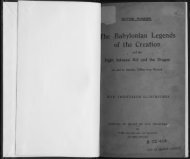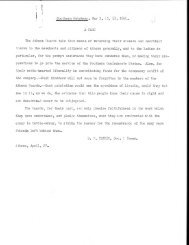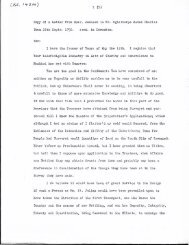THE SHE KING; OR, THE BOOK OF ANCIENT POETRY
THE SHE KING; OR, THE BOOK OF ANCIENT POETRY
THE SHE KING; OR, THE BOOK OF ANCIENT POETRY
Create successful ePaper yourself
Turn your PDF publications into a flip-book with our unique Google optimized e-Paper software.
196 <strong>THE</strong> <strong>BOOK</strong> <strong>OF</strong> <strong>POETRY</strong>. [PART II.<br />
I beat the drums, and in the dance<br />
Lead joyously the train.<br />
Oh ! good it is, when falls the chance,<br />
The sparkling cup to drain.<br />
VI.<br />
The T'een paou; narrative. AN ODE RESPONSIVE TO ANT or <strong>THE</strong><br />
FIVE PEECEDING. HIS <strong>OF</strong>FICERS AND GUESTS, FEASTED BY <strong>THE</strong> <strong>KING</strong>,<br />
CELEBRATE HIS PBAISES, AND DESIRE F<strong>OR</strong> HIM <strong>THE</strong> BLESSING <strong>OF</strong><br />
HEAVEN AND <strong>OF</strong> HIS ANCEST<strong>OR</strong>S.<br />
1 Heaven shields and sets thee fast.<br />
It round thee fair has cast<br />
Thy virtue pure.<br />
Thus richest joy is thine ;—<br />
Increase of corn and wine,<br />
And every gift divine,<br />
Abundant, sure.<br />
2 Heaven shields and sets thee fast.<br />
From it thou goodness hast ;<br />
Bight are thy ways.<br />
Its choicest gifts 'twill pour,<br />
That last for evermore,<br />
ISIor time exhaust the store<br />
Through endless days.<br />
3 Heaven shields and sets thee fast,<br />
Makes thine endeavour last,<br />
And prosper well.<br />
Like hills and mountains high,<br />
Whose masses touch the sky;<br />
Like stream aye surging by;<br />
Thine increase swell!<br />
4 With rite and auspice fair,<br />
Thino offerings thou dost bear,<br />
And son-like give,<br />
The seasons round from spring,<br />
To olden duke and king,<br />
"Whose words to thee we bring:—<br />
" For ever live."<br />
BE I. VII.] <strong>THE</strong> <strong>BOOK</strong> <strong>OF</strong> <strong>POETRY</strong>.<br />
5 The Spirits of thy dead<br />
Pour blessings on thy head,<br />
Unnumbered, sweet.<br />
Thy subjects, simple, good,<br />
Enjoy their drink and food.<br />
Our tribes of every blood<br />
Follow thy feet.<br />
6 Like moons that wax in light ;<br />
Or suns that scale the height ;<br />
Or ageless hill;<br />
Nor change, nor autumn know ;<br />
As pine and cypress grow ;<br />
The sons that from thee flow<br />
Be lasting still !<br />
VIL<br />
197<br />
The Ts'ae me; allusive and narrative. AN ODE ON <strong>THE</strong> DESPATCH<br />
<strong>OF</strong> TROOPS TO GUARD <strong>THE</strong> FRONTIERS ON <strong>THE</strong> N<strong>OR</strong>TH AGAINST <strong>THE</strong><br />
WILD TRIBES <strong>OF</strong> <strong>THE</strong> HEEN-YUN.<br />
This and the next two pieces form a triad, having reference to the same<br />
expedition ; this being appropriate to its commencement, those to its<br />
conclusion. Haou says the expedition was undertaken in the time of<br />
king Wan, when he was still only duke of Chow, in charge of all the<br />
regions of the west, and discharging his duty to the king of Shang. Choo<br />
denies that the pieces are of so early an origin, and says that " the son of<br />
Heaven" in the 8th ode must be one of the kings of Chow. I agree<br />
with him in this, but the date of the composition cannot be determined<br />
more particularly.<br />
Though intended to encourage the departing troops, this piece is writ<br />
ten as if it were their own composition, giving their feelings on setting<br />
out, and in the progress of the expedition, down to its close. So far, the<br />
structure may be compared with that of the second ode of this Book.<br />
It is difficult to say who the Heen-yun, against whom the expedition<br />
was directed, really were. Choo simply says that they were " wild tribes<br />
Of the north." Ch'ing K'ang-shing (about the end of our second cen<br />
tury) says that they were the same tribe that in his days went by the name<br />
of Heung-noo. I suppose that both the names are imperfect phonetic<br />
expressions Of the same sound, which we also have adopted in Huns.<br />
Wang Taou, who assisted me in the preparation of my larger Work, holds<br />
that the Heen-yun of Yin and Chow, the Heung-noo of Ts'in and Han,<br />
and the Tnh-keueh of Suy and T'ung, all refer to the same tribes. Sze-<br />
ma Ts'een, in his Record of the House of Chow, and of the Heung-noo, says<br />
that in the time of king E (B.C. 933— 909), those northern tribes became<br />
very troublesome, and refers to this ode as a composition of that time.








